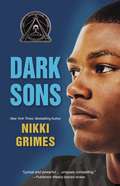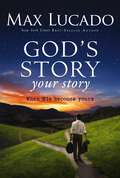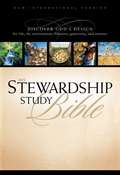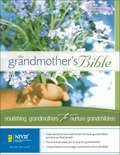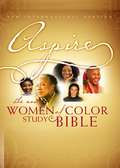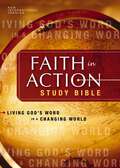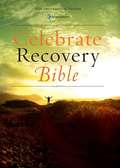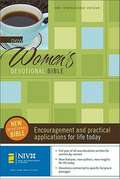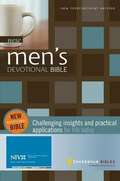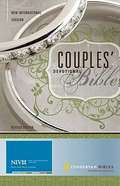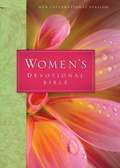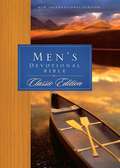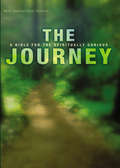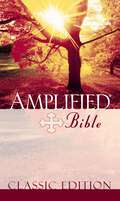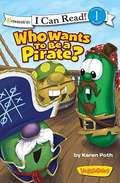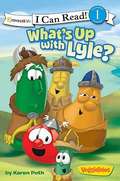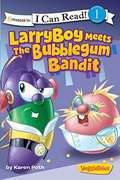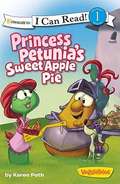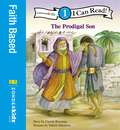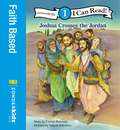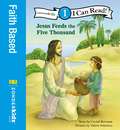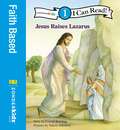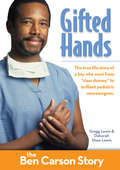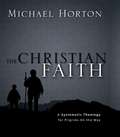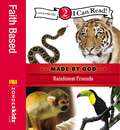- Table View
- List View
Dark Sons
by Nikki GrimesIn this winner of the Coretta Scott King Honor, bestselling and award-winning author Nikki Grimes uses free-verse poetry to powerfully tell the story of two boys, living in different times and lands, who both struggle with their faith as they watch their families fall apart. Sam’s father was always a strong Christian, and so when his dad leaves Sam and his mom for another woman, and then announces his new wife is pregnant, Sam feels abandoned—even by God. Ishmael knows he’s the first son of Abraham, and feels cherished by his father because of this position. But when visitors tell Abraham and his cruel wife, Sarah, that the real promised child will arrive soon, Ishmael is worried—and when Isaac arrives, Abraham becomes distant. Even Abraham’s God seems to be leaving Ishmael behind. Sam and Ishmael’s stories and strong poetic voices connect to create a powerful narrative structure in Grimes’ story of faith, heartache, and forgiveness.
God's Story, Your Story: When His Becomes Yours (The Story)
by Max LucadoCarpools and car crashes, job switches and joint custody, moves and motionlessness. Is there a cohesive storyline to the chaos, confusion, and clutter of your daily life? According to well-loved author Max Lucado, the answer is a resounding yes! So what is the text of your life? With his unequaled warmth and honesty, Lucado plumbs the depths of your storyline and comes up smiling. “Your story indwells God’s,” writes Lucado. “This is the great promise of the Bible and the hope of this book … Above and around us God directs a grander saga, written by his hand, orchestrated by his will, unveiled according to his calendar. And you are a part of it …” Join Max for an unforgettable journey woven with New Testament stories and contemporary examples of God’s beautiful story-making skills. The beginning of the narrative is legendary, the middle unfolds with surprises still in store, and the ending of your final earthly chapter ushers in a reunion that almost defies description. It’s time to see what your life looks like when God’s story becomes your story.
NIV Stewardship Study Bible
by ZondervanThe NIV Stewardship Study Bible uses a variety of engaging features to lead individuals through a comprehensive study of what it means to be managers entrusted with the resources of God. Through 366 Exploring Stewardship notes, profiles of individuals, notes on challenges to stewardship, quotes on stewardship from respected Christians throughout the ages, and other articles and helps, the NIV Stewardship Study Bible projects a positive picture of the privilege that we have to manage what God has given us to his glory and to the building of his kingdom. More than just money, this Bible emphasizes stewardly responsibility in all areas of life, including relationships, creation care, money management, institutions, and caring for the poor, among other areas. It's been pulled together with the purpose of changing perceptions about what the word 'stewardship' means---not something intended to be draining and guilt-inducing, but rather motivating, empowering and uplifting. The NIV Stewardship Study Bible has been endorsed by Crown Ministries, Dave Ramsey, Good $ense ministries, the Barnabas Foundation, Prison Fellowship, and various other programs and ministries that seek to encourage responsible stewardship among Christians. This Bible will be a natural 'next step' for individuals and groups who benefit from these ministries and take part in their programs.
The Grandmother's Bible
by Various AuthorsFor many women, being a grandmother is God’s finest gift—they have achieved great depth of experience and breadth of love, and they have grandchildren with whom to share these qualities. The Grandmother’s Bible is the first Bible published for this active, engaged, Bible-reading audience. Over 60 well-known Christian women—including Ruth Graham, Elisa Morgan, Elizabeth George, Thelma Wells, Karen Kingsbury, and Carol Cymbala—share their thoughts, stories, and encouragement in this Bible’s articles and daily devotionals. With a focus on daily prayer, this uniquely personal Bible offers guidance, inspiration, and practical tools as grandmothers share their love and God’s Word with their grandchildren. Features: • 365 devotions – readings draw grandmothers closer to their Lord and to their grandchildren • Grandchild in Focus – a simple plan to help grandmothers pray regularly for their grandchildren • Praying the Scriptures for Your Grandchild – Bible verses in a prayer format • Stories to Share – over 150 key Bible stories ideal for sharing specific life lessons • Talking Points – a practical guide for using Scripture to discuss over 40 relevant topics, such as salvation, knowing God’s will, friendship, etc. • Perspectives – original, thought-provoking articles addressing personal aspirations and the joys and challenges of being a grandmother • Special sleeve to hold grandchild’s photo • Custom presentation pages • Two-color design in an easy-to-read type • Book introductions, topical index, and more • Complete New International Version
Aspire: For Strength and Inspiration
by ZondervanAspire: The New Women of Color Study Bible gives you perspectives and insights that focus God’s Word directly on your world as an African-American woman. 100 “Inspire” notes provide insight from God’s Word on issues of life and leadership; 90 prayers tied to Scripture help guide your personal prayers; 95 “From God” notes encourage you to see yourself through God’s eyes; 140 “African Presence” notes reveal the African influence in Scripture; 50 quotes offer the wisdom of African-American women; and 75 character profiles unlock lessons from the lives of "Women of the Bible". Also included in this Bible are 66 book introductions and outlines, the “Family Roots” family tree, reading plans, color maps, cross-references, NIV concordance, index, and more. This eBook has been optimized for reading on color screens, but will still function effectively on other devices. NIV ©2011 The New International Version (NIV) translation of the Bible is the world’s most popular modern English Bible – easy to understand, yet rich with the detail found in the original languages
NIV Faith in Action Study Bible: Living God's Word in a Changing World
by ZondervanThe Faith in Action Study Bible provides you with a deeply rooted understanding of how Scripture applies to contemporary issues and personal growth. You will discover the relationship between history, culture, and the biblical narrative, and gain insight into the fact that God’s heart for our world that transcends times and customs. Designed in a highly readable passage-by-passage commentary style, the footnotes of this Bible are its centerpiece: “There and Then” notes shed light on the original context and significance of a passage, and “Here and Now” notes help you see the relevance of the passage for your life and the world. Also included are articles by respected Christian authors and “Snapshots” of individuals with a high-impact faith who have embraced Christianity not only as a view of life, but also a way of life. Over 175 charts, graphs, and tables highlight thought-provoking worldwide realities, helping you evaluate your spiritual life and suggesting action/impact steps to help you grow, share, and live your faith. With a 16-page full-color map section, this eBook has been optimized for reading on color screens, but will still function effectively on other devices. NIV ©2011. The New International Version (NIV) translation of the Bible is the world’s most popular modern-English Bible—easy to understand, yet rich with the detail found in the original languages.
The Celebrate Recovery Bible
by ZondervanIf you long to break free from life's hurts, hang-ups, and habits, the Celebrate Recovery Bible is a wise and empowering ally. <P><P>Reinforcing that the Gospel and life in Jesus Christ truly are about redemption, not condemnation, the Celebrate Recovery Bible gives you the insights you need, a proven path to follow, and the encouragement and inspiration to do so. It is based on eight recovery principles found in Jesus' Sermon on the Mount and the underlying Christ-centered twelve steps of the proven Celebrate Recovery program*, a part of Purpose Driven Ministries. <P>Use it with the program or apart from it. Either way, the Celebrate Recovery Bible offers you help and hope for every stage of recovery. It lifts you up and shows you how to walk, step by attainable step, on a path of healing and liberty. From relevant and instantly applicable lessons to see-yourself biblical character studies and recovery stories that deal honestly with today's grittiest issues, this Bible helps you bring God's Word directly to bear on all kinds of struggles. <P> Anger problems, sexual addiction, alcohol and drug abuse, gambling, divorce, eating disorders---whatever you're dealing with---if you long for a way out, if your broken heart needs hope, this Bible will come alongside you on the path to recovery. Also included in this Bible are book introductions, a topical index, and thirty days of devotional readings. NIV 2011. <P> The New International Version (NIV) translation of the Bible is the world's most popular modern-English Bible---easy to understand, yet rich with the detail found in the original languages. <P> *Celebrate Recovery is a biblically based program helping those who are struggling with hurts, hang-ups, and habits by showing them the loving power of Jesus Christ through the recovery process. The Celebrate Recovery program is offered in thousands of churches worldwide.
New Women's Devotional Bible
by ZondervanAn all-new devotional Bible, the New Women's Devotional Bible helps a new generation of Christian women apply God's Word to their lives. It includes a fullyear of all-new devotions by women of God. Added features from its bestselling predecessor make this Bible more engaging, practical, and versatile. Features Include:* Complete text of the NIV---the most read, most trusted Bible translation* A full year of weekday and weekend devotions bring insight and inspiration. Also included are questions for reflection to help women apply God's Word to life. * Devotions by well-known---and not-so-well-known women of God, including Joni Eareckson Tada, Elisabeth Elliot, Lynne Hybels, Anne Graham Lotz,and Katie Brazelton* Multiple reading plans for year-after-year use* Introductions for each book of the Bible* 500 callouts spotlighting key verses of the Bible for memorization and contemplation* Author index with biographical information on each contributor* Subject index to help you locate topics easily* Presentation page* Double-column format
New Men’s Devotional Bible
by ZondervanAn all-new devotional Bible, the New Men's Devotional Bible helps apply God's Word to a new generation of Christian men. It includes a full year of all-new devotions by well-known---and not-so-well-known---men of God. Added features from its bestselling predecessor make this Bible more engaging, practical, and versatile than ever. Features:* Complete text of the NIV---the most read, most trusted Bible translation* A full year of weekday and weekend devotions along with application statements, questions for reflection, and more* Devotions written by a gifted author team also feature insights by Rob Bell, Chuck Colson, Brennan Manning, Brian McLaren, John Piper, Lee Strobel, Rick Warren, and Ravi Zacharias* Multiple reading plans for year-after-year use* Introductions for each book of the Bible* Over 400 callouts spotlighting key verses of the Bible for memorization and contemplation* Author index with biographical information on each contributor* Subject index to help you locate topics easily* Presentation page* Easy-to-read typesetting in a double-column format
Couples’ Devotional Bible: New International Version
by ZondervanNow thoroughly revised, with a new cover and all-new devotions that reflect the concerns couples face today, the bestselling Couples' Devotional Bible is designed to help you build your relationship on the one foundation you can count on: God's Word. Developed in partnership with Christianity Today International's Marriage Partnership magazine staff and contributors, this Bible was created to aid couples, particularly in the first years of marriage, in understanding the biblical foundation for marriage. Topics include: Communication. Work and Career. Sex. Setting Goals. Step Parenting. Money. Fears. Worship. Forgiveness. Each devotion is tailored and relevant, written to apply God's words to issues that are important to couples. Features:* New International Version text* 260 all-new weekday devotions by contributors such as Lauren Winner, Jennifer Schuchmann, Wayne Brouwer, and Carla Barnhill* Connection Time at the end of every weekday devotion promotes application and interaction* 52 weekend devotions include advice from bestselling writers, marriage therapists, and pastors, including Les and Leslie Parrott, Gary Thomas, Bill and Lynne Hybels, and Gary Smalley* Weekend devotions also contain tips, helps, quizzes, activities, and an application tied to couples from the Bible* Index to features, list of contributors, recommended reading . . . and more* Double-column formatFont size: 8. 8pt
The Women's Devotional Bible, NIV
by Zondervan"Encouragement, insight, and inspiration for today's Christian women: the Women's Devotional Bible Classic offers hope, health, and inspiration to help you understand what Scripture has to say about your needs, questions, challenges, and interests. Whether you are a young mother, a grandmother, are single or married, the Women's Devotional Bible Classic was created for you by women like you, including Debby Boone, Jill Briscoe, Gloria Gaither, Ruth Bell Graham, Joni Eareckson Tada, Shirley Dobson, Luci Swindoll, and Corrie ten Boom. Fifty-two weeks of devotions--an entire year of insight and perspectives from over 100 women of all ages and walks of life--will challenge you, deepen your understanding of God, and help you serve him more faithfully. Brief daily devotional messages encourage and inspire you throughout the week, and for Saturdays and Sundays, "Weekending" leads you through a Scripture reading and a short reflective meditation. Concentrating on the special needs and interests of women, devotionals cover such topics as love, marriage, work, children, church, friends, home, and much, much more. A subject index offers easy access to topics addressed in the devotions, and an author index includes biographical information about each contributor. Book Introductions provide background and perspective on the biblical narrative. You will discover the ways God works in your life through family, career and community, in failure and success, and through all seasons of life. From facing challenging circumstances to being real before God, you will learn what it means to be a woman of faith in the real world and to honor Christ with your life. NIV ©2011. The New International Version (NIV) translation of the Bible is the world's most popular modern-English Bible--easy to understand, yet rich with the detail found in the original languages. "
Men’s Devotional Bible, Classic Edition
by Zondervan"The NIV Men's Devotional Bible Classic is a spiritual resource and daily companion, offering you a higher perspective on the issues you grapple with in a down-to-earth world. Whether you're a father or grandfather, are singled or married, the NIV Men's Devotional Bible Classic is written for you by men like you. You'll sit down with classic writers like Dietrich Bonhoeffer, C. S. Lewis, and A. W. Tozer, and you'll savor the contemporary insight of Charles Colson, James Dobson, Chuck Swindoll, Ben Carson, Dave Dravecky, Charles Stanley, Bill Hybels, Tom Landry, Philip Yancey, and many others. Fifty-two weeks of devotions will challenge you, deepen your understanding of God, and help you serve him more faithfully. Brief daily devotional messages encourage and inspire you throughout the week, and for Saturdays and Sundays, "Weekending" leads you through a short reflective devotion and Scripture readings. The topics are broad, the issues important: Commitment. Friendship. Money. Anger. Work. Disappointment. Fatherhood. Stress. Integrity. Servanthood. Worship. Day by day, the NIV Men's Devotional Bible Classic reveals the treasure of how biblical insight brings today's troubles and triumphs into eternal perspective. A subject index offers easy access to topics addressed in the devotions, and an author index includes biographical information about each contributor. Also included are book introductions that provide background and perspective on the biblical narrative. You will learn to see the ways God works in your life through family, career and community, in failure and success, and through all seasons of life. You will discover insights that will impact your life, deepen your understanding of God, and give you the wisdom you need to live with courage and vision, no matter what your circumstances. NIV ©2011. The New International Version (NIV) translation of the Bible is the world's most popular modern-English Bible--easy to understand, yet rich with the detail found in the original languages. "
The Journey, eBook: A Bible for the Spiritually Curious
by Willow Creek Association"""You will seek me and find me when you seek me with all your heart.""—Jeremiah 29:13 The Journey is uniquely designed to help you discover the practical aspects of Christianity and better understand God. Patterned after the Willow Creek model of ministry and intended for those in the investigative stage of their spiritual journey, The Journey’s “seeker-sensitive” approach addresses key questions you may have about the Bible and its relevance today. Notes and insights are woven throughout the complete NIV Bible text, drawing you into the message and pointing the way to a relationship with Jesus. ""Icons"" trace six seeker themes throughout Scripture: ""Discovering God,"" ""Addressing Questions,"" ""Strengthening Relationships,"" ""Reasons to Believe,"" ""Knowing Yourself,"" and ""Managing Resources."" Also included in The Journey are introductory articles that define key concepts involved in being a spiritually curious seeker, book introductions, indexes, a dictionary/concordance, and a “Faith Alive” reading plan covering Genesis, Deuteronomy, John, Acts, and Romans. NIV ©2011. The New International Version (NIV) translation of the Bible is the world’s most popular modern-English Bible—easy to understand, yet rich with the detail found in the original languages."
Amplified Bible: Captures The Full Meaning Behind The Original Greek And Hebrew
by ZondervanWhen Your Knowledge of the Original Languages of the Bible Is Limited and You Don't Want to Lose Anything in the Translation If you want to get all the rich nuances and shades of meaning of the original Bible languages, the Amplified Bible is for you. No knowledge of Greek or Hebrew is required-just a desire to know all that God says in his Word. With its unique system of brackets, parentheses and italics, the Amplified Bible defines and expands key words and phrases right in the text. Verse by verse, the full meaning of Scripture unfolds as you read. And this Bible features other study aids as well to help you clearly understand God’s Word: - Footnotes-provide concise historical and archaeological information and devotional insights, plus hundreds of references to select sources and authors. - Book Introductions-tell you about the book’s author, background, purpose, and themes. - Concordance-helps you find the location of verses (25,000 entries). - Bibliography and Glossary-give you a handy list of the sources cited in the study notes and the most frequent amplifications in the text.
Who Wants to Be a Pirate? (I Can Read! #Level 1)
by Karen PothUsing the Veggie Tale brand as the backdrop for this Level One I Can Read series, we are sure to have four highly successful ICR books to add to the Zonderkidz ICR line. Combining the ever-popular Veggie humor and characters with strong messages of God's love and acceptance, these books will be best sellers for the retailer and best-loved books by the families that purchase them
What’s Up with Lyle? (I Can Read! #Level 1)
by Karen PothUsing the Veggie Tale brand as the backdrop for this Level One I Can Read series, we are sure to have four highly successful ICR books to add to the Zonderkidz ICR line. Combining the ever-popular Veggie humor and characters with strong messages of God's love and acceptance, these books will be best sellers for the retailer and best-loved books by the families that purchase them
LarryBoy Meets the Bubblegum Bandit (I Can Read! #Level 1)
by Karen PothUsing the Veggie Tale brand as the backdrop for this Level One I Can Read series, we are sure to have four highly successful ICR books to add to the Zonderkidz ICR line. Combining the ever-popular Veggie humor and characters with strong messages of God's love and acceptance, these books will be best sellers for the retailer and best-loved books by the families that purchase them
Princess Petunia’s Sweet Apple Pie (I Can Read! #Level 1)
by Karen PothUsing the Veggie Tale brand as the backdrop for this Level One I Can Read series, we are sure to have four highly successful ICR books to add to the Zonderkidz ICR line. Combining the ever-popular Veggie humor and characters with strong messages of God's love and acceptance, these books will be best sellers for the retailer and best-loved books by the families that purchase them
The Prodigal Son: Level 1 (I Can Read! #Level 1)
by Crystal BowmanChristian parents especially appreciate books for their young readers that help them understand more about God. Reading the Bible can be a very overwhelming challenge for young readers. Therefore, Bible stories written in a learn-to-read format are a welcomed product. This is the idea behind the proposal Bible Stories for I Can Read! Level1. When interesting stories from the Bible are written with on-level vocabulary, the child gains knowledge of Scripture and biblical truths while developing his or her reading skills. The result is a meaningful and positive reading experience for the child.
Joshua Crosses the Jordan River: Level 1 (I Can Read! #Level 1)
by Crystal BowmanChristian parents especially appreciate books for their young readers that help them understand more about God. Reading the Bible can be a very overwhelming challenge for young readers. Therefore, Bible stories written in a learn-to-read format are a welcomed product. This is the idea behind the proposal Bible Stories for I Can Read! Level1. When interesting stories from the Bible are written with on-level vocabulary, the child gains knowledge of Scripture and biblical truths while developing his or her reading skills. The result is a meaningful and positive reading experience for the child.
Jesus Feeds the Five Thousand: Level 1 (I Can Read! #Level 1)
by Crystal BowmanChristian parents especially appreciate books for their young readers that help them understand more about God. Reading the Bible can be a very overwhelming challenge for young readers. Therefore, Bible stories written in a learn-to-read format are a welcomed product. This is the idea behind the proposal Bible Stories for I Can Read! Level1. When interesting stories from the Bible are written with on-level vocabulary, the child gains knowledge of Scripture and biblical truths while developing his or her reading skills. The result is a meaningful and positive reading experience for the child. Possible titles include: Old Testament: Twelve Special Stones, The Life of Samuel, Elijah and Ahab at Mt. Carmel (1 Kings 18), The Healing of Naaman (2 Kings 5), New Testament: The Two Sons, Jesus Feeds 5000 (Matthew 14, Mark 6, John 6), Lazarus Rises from the Dead (John 11), Jesus Walks on Water (Matthew 14), Saul’s Conversion (Acts 9)
Jesus Raises Lazarus: Level 1 (I Can Read! #Level 1)
by Crystal BowmanChristian parents especially appreciate books for their young readers that help them understand more about God. Reading the Bible can be a very overwhelming challenge for young readers. Therefore, Bible stories written in a learn-to-read format are a welcomed product. This is the idea behind the proposal Bible Stories for I Can Read! Level1. When interesting stories from the Bible are written with on-level vocabulary, the child gains knowledge of Scripture and biblical truths while developing his or her reading skills. The result is a meaningful and positive reading experience for the child. Possible titles include: Old Testament: Twelve Special Stones, The Life of Samuel, Elijah and Ahab at Mt. Carmel (1 Kings 18), The Healing of Naaman (2 Kings 5), New Testament: The Two Sons, Jesus Feeds 5000 (Matthew 14, Mark 6, John 6), Lazarus Rises from the Dead (John 11), Jesus Walks on Water (Matthew 14), Saul’s Conversion (Acts 9)
Gifted Hands, Kids Edition: The Ben Carson Story
by Gregg Lewis Deborah Shaw LewisBen Carson used to be the class dummy. Today he is one of the world’s most brilliant surgeons. Gifted Hands Kids Edition tells the extraordinary true story of an angry, young boy from the inner city who, through faith and determination, grew up to become one of the world’s leading pediatric neurosurgeons. When Ben was in school, his peers called him the class dummy. But his mother encouraged him to succeed, and Ben discovered a deep love of learning. Ben found that anything is possible with trust and determination.
The Christian Faith: A Systematic Theology for Pilgrims on the Way
by Michael S. HortonMichael Horton’s highly anticipated The Christian Faith represents his magnum opus and will be viewed as one of—if not the—most important systematic theologies since Louis Berkhof wrote his in 1932. A prolific, award-winning author and theologian, Professor Horton views this volume as “doctrine that can be preached, experienced, and lived, as well as understood, clarified, and articulated.” It is written for a growing cast of pilgrims making their way together and will be especially welcomed by professors, pastors, students, and armchair theologians. Features of this volume include: (1) a brief synopsis of biblical passages that inform a particular doctrine; (2) surveys of past and current theologies with contemporary emphasis on exegetical, philosophical, practical, and theological questions; (3) substantial interaction with various Christian movements within the Protestant, Catholic and Orthodoxy traditions, as well as the hermeneutical issues raised by postmodernity; and (4) charts, sidebars, questions for discussion, and an extensive bibliography, divided into different entry levels and topics.
Rainforest Friends: Level 2 (I Can Read! #Level 2)
by ZondervanThese exciting photos and facts show children the wonders of God’s creation. Includes simple text perfect for level two readers. Titles include: Rainforest Creatures; Under the Sea; Birds of the Air; Bugs, Bugs, Bugs; Freezing Friends; and Creatures Down Under. Rainforest Creatures features unusual yet familiar animals like the sloth and the tree kangaroo and facts about their habitat. Under the Sea will feature facts about sea creatures such as the giant squid, baseball fish, and the blue-ringed octopus. Birds of the Air will include facts about flying friends like the macaw, toucan, flamingo, and yellow-bellied sapsucker. Bugs, Bugs, Bugs will tell about stinkbugs, dung beetles, killer bees, and more. Creatures Down Under will tell about the platypus, kookaburra, kangaroo, and crocodile and coral. Freezing Friends will focus on Polar bears, seal, penguin, and walrus. Farm Animal Babies will focus on familiar farm animal babies, their special names, and characteristics. Forest Animal Babies will focus on fun forest animal babies like raccoons, mountain lions, and baby birds and their special characteristics. Jungle Animal Babies will focus on fun jungle animal babies like monkeys, panthers, and baby birds and their special characteristics.
